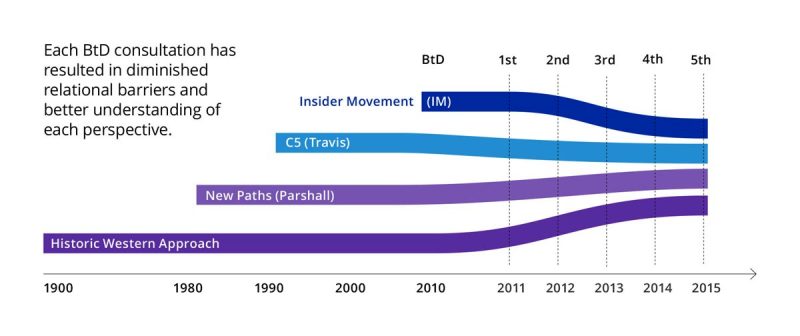Fostering Fruitful Dialogue In Contentious Relationships


By L.D. Waterman
A first-hand narrative of Bridging the Divide’s experience in handling disagreements among missionaries.
In the 1980’s, a number of publications suggested new approaches to evangelism in the Muslim world, seeking to free the gospel message from added trappings of Western Christendom. Noteworthy among these were New Paths in Muslim Evangelism by Phil Parshall, Muslims and Christians On the Emmaus Road: Crucial Issues in Witness Among Muslims edited by Dudley Woodberry, and publications influenced by Ralph Winter, including Mission Frontiers, International Journal of Frontier Missiology and Perspectives on the World Christian Movement: A Reader.
In the 1990’s many missionaries working in the Muslim world began to move beyond what Parshall had suggested, and explored an approach described by John Travis as “C5.”1 In the early 2000’s some advocates of C5 began to use the phrase “Insider Movement” to describe groups of Jesus-followers who remained within their socio-religious community.2
By 2010, tensions and disputes had reached a boiling point between proponents and opponents of Insider Movements (IM) (and similar but not identical “C5” contextualization). Articles and conferences proclaimed opposing points of view on the subject. Both sides marshaled vigorous arguments backed with Scripture references and numerous anecdotes, all of which seemed to only drive the two camps further apart.
On one side, popular mission journals devoted much space to articles by IM proponents, including reports of explosive growth using an “insider” approach. A growing number of popular training events such as Common Ground promoted the insider paradigm and some IM proponents made efforts to avoid the literal translation of biblical divine familial terms such as “Son of God” and descriptions of God as “Father.”
On the other side, many missionaries expressed concerns about what appeared to be theologically dubious practices and statements, along with skepticism about the numbers being reported. An appearance of secrecy tended to fuel suspicion and a sense that missiological experiments were being prematurely presented as a “silver bullet” for reaching the Muslim world. Those questioning or disputing IMs often felt disenfranchised, with minimal public voice to air their concerns. Out of this sprang seminars and on-line forums critical of the insider approach. As concerns began to trickle down to sending churches and denominations, some responded by defunding entire organizations if any of their members were involved in “insider ministry.”
Beginnings of Bridging the Divide
In early 2011, a handful of mid-level leaders of evangelical ministries among Muslims began discussing the need for a way to improve the quality and fruitfulness of disputes about IM. We wanted to get key people into the same room, to sit down and talk with each other. But more than just talk, to build relationships and begin to get to know one another at a heart level. The idea developed of a consultation that would bring together scholar-practitioners and opinion leaders on these subjects, for a few days of substantial interaction—on a relational as well as a missiological level.
In order to lay a credible foundation for useful interaction, these leaders joined together with others from across the spectrum of views on contextual issues to form an eight-member team (later called a Facilitation Team–FT) to organize the consultation. The balance of perspectives among the FT was essential for gaining credibility with a wide variety of major stakeholders in these issues. The FT shared a commitment to prioritize balanced, fair, and fruitful consultation over the advancement of personal preferences or opinions on these issues. This laid a foundation for positive and collegial interaction in discussions of who should be invited to take part in the proposed consultation.
Initially, the FT faced a general context of very low trust on both sides of the divide. Many workers wondered if they could trust their “opponents” to be honest and reasonable, and some expressed concern that individuals or ministries might be publicly exposed if they were present at or discussed in a not-entirely-sympathetic forum. In order to maximize the potential for fruitful consultation, a careful vetting process was established for invitations to the consultation. All potential attendees were required, as part of the registration process, to sign a statement agreeing to:
Maintain confidentiality, not sharing outside the consultation any information gained at the consultation.
Treat other attendees as fellow believers, including an application of the biblical “one anothers.” This explicit highlighting of the biblical commands and standard contributed significantly to a shared agreement to guard our hearts and tongues, even in the midst of heated disagreement about issues of profound spiritual importance. In our five years of history, only one invitee refused to sign the statement and was thus uninvited to the consultation.
The FT recognized that the consultation discussion would require a skilled meeting facilitator who could provide safe and unbiased moderation of the interactions. Since all FT members held strong opinions on the issues, a neutral outside facilitator from VisionSynergy was invited to moderate the consultation and provide counsel to the FT in planning the event.
The first Bridging the Divide (BtD) consultation covered four days in June 2011, with more than 40 participants representing a wide range of views and practices in ministry to Muslims. The schedule was carefully designed to facilitate the development of personal relationships as well as substantial discussion of hot issues (as anticipated by the FT and chosen by attendees). Activities included:
- Pre-readings: relevant articles and drafts of papers to be presented
- Table discussion groups
- Praying together
- Worshiping together
- Sharing meals together
- Presentation of brief scholarly papers with response
- Large group discussion
- Panels with Q&A
- Informal conversations
- A half-day group outing to a scenic spot
- Development of a summary consensus document.3
The most significant outcome of BtD’s first consultation was a radical diminishing of relational barriers. The consultation enabled participants to see something of the hearts of those with other views: that they share not only a love for Christ but also a longing to see as many Muslims as possible come to saving faith in Him. During a final session, participants shared with the group their highlights from the consultation. Consistent with the comments of many, one participant stood, pointed to a person sitting near him, and said, “Before I came here, I had read this brother’s articles and I knew I didn’t like him and I disagreed vehemently with his views. We still don’t agree on everything, but I can honestly say that I love this brother and his passion for reaching Muslims with the gospel.”
A second major outcome of the consultation was a realization that what had been portrayed and experienced as two opposing “camps” was actually better viewed as a spectrum of positions. The expression of more nuance on the issues revealed a wide range of perspectives and preferred approaches. This new information greatly enriched the understanding of those involved.

Development of the Discussion
At the end of the consultation, group consensus favored holding another similar consultation in the future. This resulted in similar annual consultations for the next four years. Topics discussed have included identity issues and challenges for Muslim-background followers of Jesus, divine familial terms in Bible translation, the nature of Islam, multi-generational disciple-making, ecclesiology, ethics and hermeneutics of sacred texts (both Bible and Qur’an). Each year we evaluate: have we accomplished all that’s currently needed through a consultation of this nature? Should we tackle additional issues through another consultation?

Writing a summary consensus document arose as a spontaneous felt need near the end of the first consultation. We have continued this helpful practice, which gives concrete expression to progress made and issues remaining. Though some find the process tedious, we have seen real value in summarizing together salient points of agreement and ongoing disagreement that have come to light during the course of a consultation.
After the first consultation, a group email forum enabled ongoing discussion of hot issues in Muslim ministry among members of what became the BtD network. The measure of trust and relationship that had been established at the consultation enabled ongoing fruitful interaction.
The email forum’s confidentiality enables exploration of ideas without needing to feel certain of answers before offering an opinion. One example of such an exchange yielded an especially educational result: a question about the authenticity of a document known as “The Covenants of the Prophet Muhammad.”4 BtD members have coauthored and published numerous other give-and-take articles presenting differing viewpoints; the BtD website has links to these.5
Email clearly has limitations for discussion of substantial missiological issues, since not everyone with valuable insights finds sitting at a computer an enjoyable form of communication. However, this medium does allow very valuable yet inexpensive exchange of ideas for those living far apart who engage it.
As discussions continued by email, points of ongoing friction spurred us to draft a code of ethics6 as a standard for our communication. An abbreviated form of this document (featuring Ephesians 4:29) became the footer for all emails sent via the BtD email forum. This code of ethics and regular reminder have helped keep interactions cordial and fruitful, even without ongoing face to face (or even voice) communication. After 2011, the code of ethics became a required pre-reading for ongoing BtD consultations.
After our third consultation, we realized that many of our presentations could safely be shared with the wider body of Christ (and the rest of the world). In October 2013 a BtD website was launched with material released for viewing by the global public (with pseudonyms or author’s names, according to the permissions given). The website currently averages 45 visitors per day.
As BtD consultations continued annually, new dynamics impacted the discussion. Each consultation has been attended by somewhat different personnel. We have had significant overlap of attendees, yet for the sake of newcomers, each successive BtD consultation has begun with a brief orientation to BtD’s vision, ethos, and communication norms.
A second unfolding dynamic was the adding of new members to the email forum after each consultation. For example, those who had attended BtD 2012 but not BtD 2011 entered a discussion forum with many members who had attended BtD 2011 but not BtD 2012. We wondered if the level of respectful dialogue would continue even among those who had never met before, who knew each other only as “a name on an email, saying things with which I disagree.” Thankfully, the ethos of (mostly) cordial dialogue continued, even with new members added. More than once, private emails have been sent, suggesting that an apology would be appropriate, and numerous apologies have been offered to individuals and to the group. This ongoing dynamic of iron sharpening iron has seen sparks, but definitely also much mutual sharpening.
A third major dynamic in the ongoing development of BtD interaction was the inclusion of a greater number of Muslim-background and non-Western participants. Efforts to include more non-Westerners has faced a number of challenges, among them language barriers, travel costs, and visa constraints. In light of the challenge of getting visas into the US for non-Western participants (particularly from Muslim-majority countries), we shifted our consultation venue to Turkey for 2014 and 2015. But the rise of ISIS nearby posed a fresh set of challenges for a few participants in entering Turkey. In spite of this, roughly one-third of the participants in BtD 2014 and BtD 2015 were from a Muslim background. This greatly enriched BtD discussions and stirred discussion of a possible future BtD-type gathering with only participants from a Muslim background.
Impact

The FT assesses the impact of BtD in three distinct spheres. Among the vast majority of those who have participated, we have seen a major increase in trust and mutual understanding. In a recent survey of BtD members, 68% of respondents agreed strongly and 24% agreed mildly that: “My involvement with BtD has been helpful for my perspective and ministry.” BtD has diminished polarization, reduced negative stereotypes, and brought a clearer understanding of other’s views. It has helped members improve communication habits and have a forum to raise questions and receive substantial answers from a diverse range of well-informed perspectives.
A few BtD attendees came (especially to the first consultation) apparently expecting to deliver a “knock-out punch” that would quickly settle the differences in favor of their own opinion. When that did not happen, a few individuals on both ends of the spectrum withdrew from BtD interaction, uninterested or unwilling to invest the time and effort in substantial communication with those holding such different views. Although to my knowledge no one has “converted” from one end of the spectrum to the other, the vast majority of participants have gained new and different perspectives and attitudes on these issues and have had their ministry enhanced through BtD interactions (as testified by 92% of survey respondents).
Among the larger body of Christ, BtD’s impact is much harder to assess. 56% of BtD survey respondents agreed strongly and 28% agreed mildly that: “I believe BtD has made a useful contribution to the Body of Christ’s consideration of these topics.” Although BtD is not widely known, the network has been cited as an example of positive conflict management and thoughtful interaction with issues in reaching Muslims. We have spoken into disputes between organizations and played a minor role in a denominational deliberation. For those who are interested, BtD can provide one good model of how fruitful discussion can happen among those who have strong disagreements on theological issues.
The sphere of Muslims coming to faith in Christ constitutes the ultimate purpose for BtD interactions and is also the most difficult to assess. Some excessively creative ministry approaches have likely been moderated to become more biblically sound because of BtD interactions. Quite a few unhelpful Western Christian assumptions about evangelism and discipleship have been challenged and adjusted toward a more biblical approach, thus increasing receptivity among Muslim audiences. Some biblically sound and very fruitful ministry models for reaching large groups of Muslims have been highlighted and recommended. More Muslims are now coming to faith in Christ than ever before in world history, and BtD has been on the cutting edge of studying and highlighting some approaches yielding fruit that endures. Staying in communication with those who sharpen us and ask hard questions can bring us closer to the Lord’s best.
Fruitful Practices and Lessons Learned
We have learned a lot in five years. We have seen the importance of building relationships as a vital element of fruitful dialogue. It’s easy to misunderstand and demonize an invisible person about whom our only information is a point of major disagreement. Building a relationship as brothers and sisters in Christ (including prayer and worship together, meals and relaxed conversation with one another, and opportunities to see faces and hear hearts’ desires) moves interaction to a much higher level—in attitudes, understanding, and communication patterns.
Establishing biblically-based parameters for interaction (such as confidentiality and a code of ethics) has played an important role in building trust and encouraging respectful dialogue, even in the midst of strong disagreements. Demonstration of confidentiality has increased trust, which has enabled deeper and more fruitful interaction. We have observed firsthand the truth of Stephen M. R. Covey’s statement: “In a high-trust relationship, you can say the wrong thing, and people will still get your meaning. In a low-trust relationship, you can be very measured, even precise, and they’ll still misinterpret you.”7
We have discovered along the way the value of having participants speak for themselves personally rather than on behalf of their organization or group. Speaking on behalf of an organization requires defending the position(s) of the organization; position statements must be pre-approved or accounted for afterward. Speaking only for oneself gives the possibility of “going out on a limb”: trying out an idea that one might later decide was not the best. It enables the kind of give-and-take that’s impossible when speaking on behalf of an organization. BtD has diminished defensiveness by inviting members to contribute as individuals rather than representatives of an organization. Members do take something useful back to their various spheres of influence, but we don’t expect them to voice opinions on behalf of their group.
Much effort has gone into nurturing good listening in BtD, and the fruit has been evident. Learning to really listen and understand a differing viewpoint is a very useful skill that doesn’t come easily. Research shows that “The most critical step in the Behavioral Change Staircase is actually the first part: Active listening. … But most people are terrible at listening.”8 As Proverb 18:13 says, “To answer before listening—that is folly and shame.” BtD has helped diminish the folly and shame among many of the Lord’s servants working in the Muslim world.
BtD serves as a relatively successful example of ways to increase understanding, decrease antagonism and advance communication toward the goal of God’s greater glory among all the nations of the earth. With its diversity of nations, cultures, languages, religious backgrounds, organizations, denominations, and ministry approaches, the BtD network has accomplished and continues to foster fruitful dialogue for the advancement of God’s kingdom among the unreached.
L.D. Waterman (pseudonym) is an encourager of church planting movements among unreached groups, serving with Beyond. After ten years of pastoral ministry in the US he moved to Southeast Asia, where he has served since 1993. He has been a part of Bridging the Divide’s Facilitation Team since the network was launched in 2011.
References:
- John Travis, “The C1 to C6 Spectrum: A Practical Tool for Defining Six Types of ‘Christ-centered Communities (“C”)’ Found in the Muslim Context,” EMQ 34/4 (1998), 407–408.
- Kevin Higgins, “The Key to Insider Movements: The ‘Devoted’s’ of Acts,” IJFM, 24/1 (2004), 156; Rebecca Lewis, “Promoting Movements to Christ within Natural Communities,” IJFM, 24/2 (2007), 75.
- This document, as well as summaries from later BtD consultations, are available on our website at https://btdnetwork.org/docs/.
- With permission from all contributors, this discussion was edited into an article, available on the collaborations page of the BtD website: https://btdnetwork.org/wp-content/uploads/2013/12/The-Covenants-of-the-Prophet-Muhammad-Clean-2.pdf.
- https://btdnetwork.org/collaborations/.
- Available at https://btdnetwork.org/docs/.
- Stephen M .R. Covey, The Speed of Trust (New York: Free Press, 2008), 6
- “6 hostage negotiation techniques that will get you what you want” by Jeffrey Pfeffer, https://www.bakadesuyo.com/2013/06/hostage-negotiation/.
